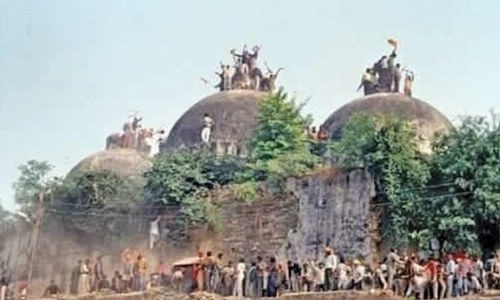Millions of Hindus will wake up at the crack of dawn this Saturday, five days before the start of India's general election, and march to nearby temples to chant a sacred hymn and renew a pledge to build a temple on the ruins of a 16th-century mosque.
Hardline Hindu allies of Indian Prime Minister Narendra Modi's ruling Bharatiya Janata Party (BJP) say they will mobilise more than 10 million people on April 6 — the start of the Hindu New Year — to shore up support for the contentious plan to build a temple in the northern town of Ayodhya.
But while the event will keep the focus on a core demand of India's Hindu nationalists, it will not overtly be part of the BJP's election campaign, signalling a softer approach by the ruling party, multiple sources familiar with discussions said.
The commitment to construct a grand temple in Ayodhya to the Hindu god-king Ram has been part of the BJP's election manifesto since the 1990s and has helped the party garner Hindu votes in state and federal elections since then.
However, the BJP and its allies are concerned that focusing on the temple issue could be too hot to handle, especially since it is now the party in power. It could worsen communal tensions and trigger religious riots in the country, said a senior BJP leader.
“We cannot underestimate the power of Hindu fringe groups, and it's best not to ignite these issues,” said a BJP leader who is overseeing the party's election strategy.
The BJP leader and two other senior party members, two federal ministers and four members of hardline Hindu groups, who didn't wish to be identified due to the sensitivity of the issue, said they reached a consensus to fold the temple issue into a broader religious and cultural discourse, without being too vocal about it.
Following a meeting between senior religious leaders and BJP politicians in January, the Vishwa Hindu Parishad (VHP) or the World Hindu Council, which is leading the movement for building the Ayodhya temple, put its agitation on hold in February.
Details of the meeting have not been published previously.
The VHP, which shares ideological ties with the BJP, would renew its demand only after the general election, its leaders said.
“While we remain committed to the cause that is so close to the hearts of Hindus, we're unanimous in our view that it's not the right time to amplify the temple issue,” said Alok Kumar, international working president of the VHP. “Politicisation leads to controversies.”
Hindu-Muslim riots
The VHP has distributed pamphlets and issued appeals on social media to participate in a chanting ceremony aimed at renewing the pledge to build the temple on the spot where many Hindus believe Ram was born, where the mosque stood.
Sanjay Mayukh, a BJP spokesman in New Delhi, declined comment on the April 6 event being organised by the VHP.
“We wish them (VHP) a success and we will celebrate the Hindu New Year too,” said Mayukh.
A militant Hindu mob tore down the mosque in 1992, sparking riots that killed about 2,000 people in one of the worst instances of sectarian violence in India since independence in 1947.
The mosque, built by a Muslim ruler in 1528, has been one of the prime causes of conflict between India's majority Hindus and minority Muslims, who constitute 14 per cent of the country's 1.3 billion people.
India's Supreme Court is now in control of the site in Uttar Pradesh state and has been weighing petitions from both communities on what should be built there.
In March, the country's top court appointed an arbitration panel to mediate in the dispute. It's verdict is yet to come.
BJP election candidates confirmed they are avoiding the temple issue in their campaigns.
Former government minister and BJP lawmaker Sanjeev Baliyan, who is contesting the election from a constituency in Uttar Pradesh, said he has instructed supporters to "refrain from using the Ayodhya issue in any political rally". At least 65 people were killed in clashes between Hindus and Muslims in Baliyan's constituency in 2013.
“The danger of any religious tension spilling out of our control would change the election mood. Best to keep religious issues away from politics for now,” he told Reuters.
Instead, Baliyan said, his campaign would focus on the BJP's achievements during its last five years in power and national security issues.
Most pollsters expect the BJP to emerge to win the highest number of seats in the election after recent military exchanges between India and arch enemy Pakistan led to a wave of nationalist fervour that has helped Modi.
But the pollsters say the BJP is unlikely to repeat its sweeping victory of 2014 because of the government's inability to provide jobs to the millions of youngsters coming into the job market each year and depressed rural incomes.
The BJP is also under fire from small business owners, traditional supporters of the party, who say they have suffered because of a rocky start to the Goods and Services Tax, India's biggest tax reform, and Modi's shock move to ban high-value banknotes in 2016.
The big question may be whether the BJP gets enough seats in the 544-member lower house of parliament to govern without having to form a coalition with other parties.
India begins voting on April 11 and the staggered election is scheduled to end on May 19. Results will be declared on May 23.
Ambuj Nigam, the leader of the Vishwa Hindu Dal, a Hindu hardline Hindu group that came into existence in 2018, said the demand for a temple would again gain momentum after the general election.
“We have put all our controversial works on hold,” said Nigam. “But as soon as election results are out, we will bring Hindu nationalism back to the forefront.”















































